- Home
- Nick Carter
Operation Che Guevara
Operation Che Guevara Read online
Annotation
Che Guevara — killer, sadist, madman… hero, saint, saviour-depending on your viewpoint or your politics.
The world believes that Che Guevara is dead. But Nick Carter, grappling with the most lethal assignment of his long career, has reason to believe that the Cuban revolutionary is still alive.
Clue number one is Teresina, a sloe-eyed peasant girl who makes love with the grandeur of a pampered princess. Clue number two is Yolanda, a wealthy, ice-cold beauty who turns into a man-eating tigress in bed. One of them can lead Nick to the man they call El Garfio — "The Hook" — the man who could be Che Guevara.
* * *
Nick Carter
IPrologue
March28th
29th
30th
IIApril1st
2nd
3rd
4th
5th
III
6th
7th
IV
8th
9th
10th
V11th
12th
13th
14th
VI15th
16th
VII17th
VIII
IX
18th
* * *
Nick Carter
Killmaster
Operation Che Guevara
Dedicated to The Men of the Secret Services of the United States of America
OCR Mysuli: [email protected]
* * *
The old man licked his lips nervously. "It was terrible, señor. Terrible. They came, everyone was in bed, except the night nurse and the girl helping her. One moment, all was still… the man who had been operated on that morning groaned now and then, but otherwise all was quiet… the next, the door was kicked open and a light was flashed into our faces."
He paused, looked at the young man in the brown suit sitting head down across from him, then at the tape recorder on the table between them.
The young man looked up. "Yes, go on," he said gently.
The old man nodded, continued. "A man came in, a man with a long beard." He gestured as if stretching his chin. "He was an ugly man, short, fat, and he carried a rifle. He went from bed to bed, poking that light into our faces. One man protested, called him a… a bad name. He struck him across the face with the rifle.
"The lights were turned on and another man came into the ward. He was younger and impatient. He told us all to get out of bed. Some could not. They were too ill. The two jerked at their mattresses and tipped them out onto the floor. They lay there screaming."
The old man was getting more agitated now. "I was fortunate," he said. "I could move around. I got out of bed as ordered, went into the corridor. It was a nightmare, señor. Men, women and small children shoved out into the corridor in only their hospital jackets — no matter how ill they were. Some were very ill, dying. Some did die because of that night, señor."
The young man nodded. "Please go on."
The old man nodded back solemnly. "There were more of these bandidos in the corridor. All carried rifles or guns of some kind. Many carried medicines they had stolen and bandages. I heard a woman screaming… a terrible sound. A man next to me whispered that they had seized the night nurse and dragged her off somewhere… and had… well, señor… you know…"
His questioner knew. The old man had been a patient in a hospital near Cochabamba, Bolivia. Three nights before the place had been raided by Red guerrillas. A doctor, a nurse, three patients had been killed, several more persons had been injured. The nurse had been raped, but she had evidently put up a strong resistance and her attacker — or attackers — had retaliated by slitting her throat. Another nurse, a nurse's aide actually, had gone mad, and her family was praying she would never regain her senses. Five, six men had raped her, and she was only 17 and had been a virgin.
Survivors, eyewitnesses like the old man, were reluctant to talk about the hospital raid. Even the Bolivian government had dismissed it with a curt statement to the press to the effect that such an attack had taken place. Period. It had taken a lot of persuasion — and the promise of a good deal of cash — to get the old man to come to this tiny hotel room in La Paz to be questioned.
"How many of these men were there?" the young man asked him now.
He shrugged. "Perhaps a dozen, perhaps more. I do not know. I counted perhaps a dozen men."
"Did you recognize any of them? Would you recognize any of them again?"
The old man looked at him a moment, then his eyes slid away. "No," he said carefully, "I did not know any of them. I would not recognize any of them again."
The interviewer didn't believe him, but he let it pass.
"Did you notice anything else about these men, anything unusual?"
"Unusual? No. They were bandits and they behaved like bandits. It is a miracle they did not kill us all. A doctor tried to stop them from taking the medicines. He stood in their way. He was a brave man. They shot him, right in the face." He pointed to his own. "Blew it away. They walked on the body as they moved in and out of the room to take the medicines."
"Did you see their leader?" the young man asked.
The witness shrugged. "I do not know. Perhaps. There was one man, outside. He did not come in where we were. I saw him through a window later when they ordered us into the cafeteria. I saw men running up to him, as if asking for orders, then running back."
"What did he look like?"
Again the old man shrugged and again his eyes slid away. "Like the others. He had a beard, a jacket like they wear in the army here and he carried a rifle."
This time the young man wasn't going to let him get off so easy. "Are you sure there wasn't something unusual about him? Or something familiar?"
The old man licked his lips again. "You understand, señor," he began hesitantly, "I am afraid. The village I come from…"
"I understand," the young man nodded. "But no one knows you are here. No one will ever know, I promise you. And," he reminded him gently, "you are going to get a lot of money."
The old man looked doubtful, but then he sighed and said, "Well, there was one thing."
He looked around, then leaned forward and whispered to the young man. The tape recorder spun on. The young man listened expressionlessly. Finally, he thanked the old man, gave him the money he'd been promised and escorted him to the door.
When the old man had gone, the young man turned off the tape recorder, took out a small pocket radio. He turned the dial, spoke into a tiny mike:
"S5 reporting, sir," he said.
"Go ahead," a voice answered tinnily.
"Suspicions confirmed, sir."
There was silence for a moment, then the voice said, "Right. Thank you."
The young man turned off the radio, put it back into his pocket. He packed the tape recorder into an old brown suitcase, then looked carefully around the room. Satisfied that he hadn't forgotten anything, he opened the door, stepped out into the hall.
The young man was an AXE field agent. The information he had just passed on to his superior was dynamite.
It had to do with a man's right hand…
Prologue
It was a different kind of search, this one, different from any I'd ever been on. As top agent for AXE, Special Espionage Branch of the United States Government, I've been all over the world, hunting down men, and their schemes. I've dealt with highly organized espionage operations and power-mad individuals, with officially sponsored threats to free men and with clandestine groups pursuing their own objectives. At first, this seemed like just another search for a wily enemy but, as I got into it, I realized I was searching not just for a man but for the truth — the truth about a figure who has beco
me a legend in his own brief time.
The legend is known by the name of Che Guevara. The truth I sought was whether he really did die in the hills of Bolivia as reported to the world. Was this apostle of revolution and hate really laid to rest in the Bolivian hills or was it the truth that was buried there?
Those who have studied the account of his death as given to the world know certain things. They know how slender the actual evidence was. They know there are always those willing to sell truth for a price. Words can be bought. Pictures can be altered. Cameras can he. The unreal can be made to seem real and the real, unreal. Men in high places and men in low can be reached — in different ways and with different rewards — but nonetheless reached.
Where, then, does truth stand in a world where sophisticated methods and techniques can serve the honest and dishonest equally well? Truth, today, must be surmised more often than it can be seen. Truth, as Boileau said, may sometimes be improbable.
And so I've set things down the way they happened, just as they happened, day by day. Those who have read the Diary of Che Guevara, prepared at the direct request of AXE, will recognize certain elements: places, people, patterns, events. They will draw their own conclusions. Some will scoff and quickly dismiss my account as fiction. But others, who believe with Boileau that the truth can be improbable, will stop and think… and wonder.
March
28th
I was in Cairo, relaxing. I'd been sent there to help out Joe Fraser, AXE Middle East man, who'd done a good, efficient hatchet job on a gold-smuggling combine.
When the message from Hawk came, telling me to stay where I was until further word, I didn't argue. Cairo, the Arab world's largest city, is the modern-day successor to ancient Baghdad, not only as a center of Arabic culture but as a pleasure mecca.
In Cairo, the pleasures of East and West hang like the ripe figs in the street market stalls. The girls of modem Cairo can be broken down into four classes: the willing, the adventuresome, the professionals and — most interesting of all — the newly liberated.
Ahmis, the girl Joe Fraser had introduced me to, was one of the "modern," «enlightened» young women who had shed the ancient veil and submissiveness that goes with it. The subjugation of women, she explained to me one evening, was never a part of Mohammed's teachings but imported from Asia Minor thousands of centuries ago. Like most of the newly enlightened, newly liberated, Ahmis was slightly heady with her new found freedom. I was happy about it, because having shed the veil, literally and symbolically, she was willing and eager to shed everything else at the drop of a whisper. Olive-skinned and black-haired, she had a small wiry body just made for curling around a man's waist, and she used it like an eager kitten, at once playful and sensuous.
The night before the message arrived we had gone to dinner at Joe Fraser's house and then, back in my modest hotel room, Ahmis decided our respective cultures should get closer together. We'd spent the evening drinking a wine distilled from rice and grapes spiked with brandy, so I was all for the idea.
She was wearing a bright-rose silk shantung dress that wasn't a sari but on that order. It wrapped around her, and as her lips, wet and thirsting, pressed themselves against mine, I unwrapped her like a Christmas package. She was eager, as I said, but not that experienced, a delightful combination. In addition, she had her own sensuous heredity which immediately came to the fore.
She reacted to my touch as a steel spring reacts. A small cry escaped her, and she flung her body backwards and up in arching invitation. She took her hands and ran them down my body, pressing and holding and caressing. Her eager desire was contagious, an exciting thing in itself. My own body flamed, and I pressed her down on the bed. Ahmis arched her back again, and I came to her. She responded with a wild intensity.
We'd brought half a bottle of the wine back from Joe Fraser's with us. After we finished enjoying each other, we drank some more. I saw Ahmis begin to glow again. She leaned forward, cupped her hands under her small breasts and rubbed them lightly over my chest. Then she put her arms around me and moved her body down over mine, rubbing her breasts against my stomach, down to my loins. There she lingered to invoke sensations of erotic rapture.
We made love again. I found her volcanic intensity both exciting and amazing. She wrapped her small, wiry body around me, and all the sensuous delights handed down from the days of the ancient Pharoahs were mine. In short, what she lacked in experience, Ahmis made up for in natural talent.
At dawn, with the cry of the muezzin sounding over the Arab quarter, we fell asleep, her small form curved against my side.
29th
I awoke to a pounding on the door and a pounding in my head. I sat up and sorted them out for a moment, put on some pants and slowly made it to the door. Sunlight streaming through the window brightened the figure of a small boy standing outside the door, an envelope in his hand.
He shoved the envelope at me. I took it, fished a few coins from my pocket and watched him vanish down the hall. Ahmis was still asleep, a sheet half over her body, her small, upturned breasts peeking provocatively over the edge. I opened the envelope and focused on the note inside.
It was only a few short fines, neatly typed.
"Go to street market," I read. "Two P.M. Tent of Teller of Fortunes. Gold and red striped tent. H."
I shaved, had some coffee and put on a white linen suit without a tie. Ahmis was still asleep, rolled over on her belly now. I kissed the back of her neck on my way to the door.
The best thing that can be said about the Cairo street market is that it's a damned good thing it's out in the open, especially under the burning midday sun. I threaded my way through the jostling crowds, past fakirs and beggars and burnoosed Arabs, past tourists and more beggars and even a Brahmin steer. I finally found the tent with the gold and red stripes. The kid who had delivered the message stood in the entranceway. I stepped inside, immediately grateful for the dark coolness. The kid moved in with me.
"You have come to see the Wise One?" he asked.
"I guess so," I replied. "Is he the Teller of Fortunes?"
The kid shook his head solemnly and pointed to a far corner of the tent. I made out a robed figure seated on a pile of cushions, wearing a desert kaffiyeh with black cord. I walked toward him, searching the face beneath the flowing kaffiyeh, unusually lean and angular for an Arab. As I drew closer, steel-blue eyes glared at me from above a long, aquiline nose. I stopped dead, a half-dozen feet away.
"I'm seeing things," I said. "That dammed rice wine."
"You're not seeing things," the robed figure growled. "Sit down."
"Yes, I am," I said, unable to keep from grinning. "I'm seeing the funniest damned thing I've seen in a long time."
I couldn't help myself. I threw my head back and laughed long and loud, so long and so loud tears came to my eyes. Hawk just sat there impassively, only his eyes reflecting his annoyance. Considering the always correct and somewhat severe New England background of the man, the masquerade was the height of incongruity — somewhat like seeing Whistler's Mother in a brothel.
"Sit down, Nick," he said. "The boy is watching you."
"As you wish, Oh Wise One." I bowed, still grinning.
Hawk shifted uncomfortably as I sat down crosslegged in front of him. "God, these things are hot as hell," he said.
"I'll bet you have a suit on underneath," I said.
"Naturally." He frowned with mild reproof.
"Naturally," I mimicked. "I figured as much. I don't think the Arabs wear them that way."
He grunted and shrugged it off. "I'm not here to attend a costume ball. I suggest we get down to business," he said with the touch of asperity typical of him.
"Yes, sir," I said.
Hawk locked those steel-blue eyes on me the way a bird of prey locks onto a field mouse. I wasn't sitting across the desk from him in AXE Headquarters. DuPont Circle, in Washington, D.C., wasn't just outside. But as far as Hawk was concerned, it might just as well have been. The i
ncongruity of our surroundings made no difference; he was all business-as-usual. He used his usual approach, too, sliding sideways into the sticky ones.
"Che Guevara," he said, snapping the name out like a bullwhip. "What do you know about him?"
"I know he's dead," I said.
"Do your?" Hawk countered. I caught the tone behind the words instantly.
"Okay. Let's just say that I know what the whole world knows, plus the secret material from our files," I said. "Until his death he was Fidel Castro's most famous export."
"Maybe he still is," Hawk said flatly.
"What does that mean?"
"It means we have reason to believe Che Guevara is still alive and engaged in renewed guerrilla activity in Bolivia," he said.
"But what about the reports of his death?" I asked. "The photos that were distributed?"
"Reports can be falsified," Hawk said grimly. "I don't doubt Major Aroyoa's statement, but there is considerable evidence that even the Major may have been duped. One report said Che was actually killed by a shot fired by a drunken sergeant after a drunken officer had failed to execute him. We know that bribery among Bolivian troops is almost legendary, and it was the Bolivian army who took Guevara. As for the photos, they are so fuzzy they could be the work of a crude retoucher. You know there are countless ways to doctor photographs."
"But he was captured, according to our best inside information," I argued.
"Yes, but remember it was reported that he was taken wounded but alive and moved to the town of Higueras where he was executed twenty-four hours later. That leaves too damned many possibilities. For instance, he could have been shot as reported but not killed. The body could have been switched with someone else's and Che taken away and nursed back to health. Or the soldier who supposedly executed him could have fired blanks. That kind of thing has happened before. The photos taken of him were said to have been taken after his capture and after his death, but we just don't know, frankly. There are loose ends all over the place. He was supposedly captured because a shot destroyed the barrel of his M-2 rifle. Yet pictures of that rifle do not show any such damage."

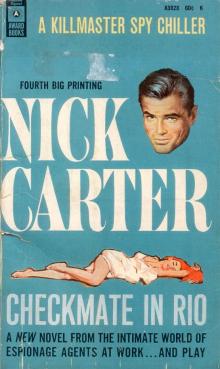 Checkmate in Rio
Checkmate in Rio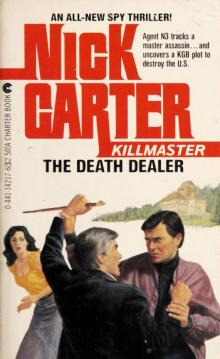 The Death Dealer
The Death Dealer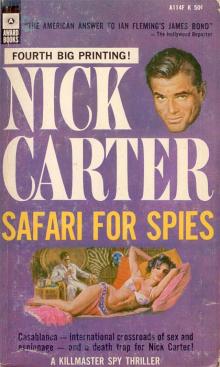 Safari for Spies
Safari for Spies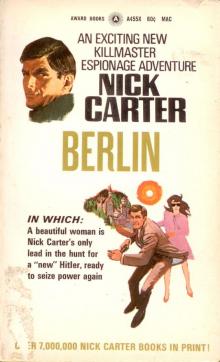 Berlin
Berlin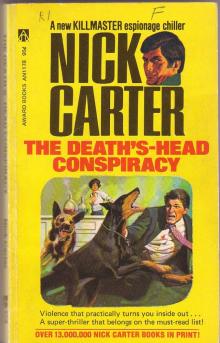 The Death’s Head Conspiracy
The Death’s Head Conspiracy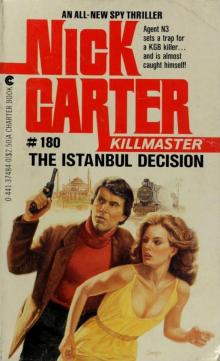 The Istanbul Decision
The Istanbul Decision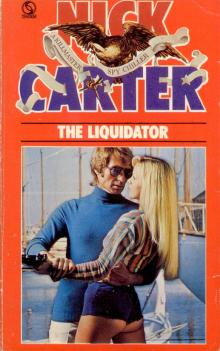 The Liquidator
The Liquidator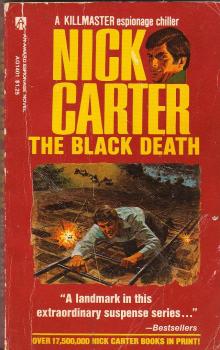 The Black Death
The Black Death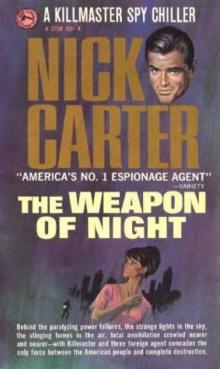 The Weapon of Night
The Weapon of Night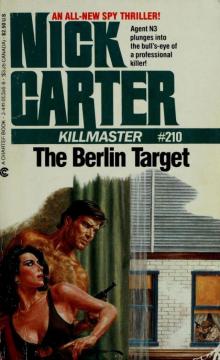 The Berlin Target
The Berlin Target Temple of Fear
Temple of Fear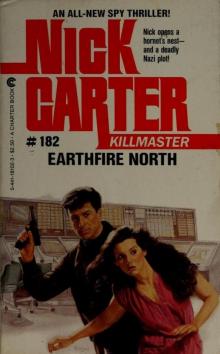 Earthfire North
Earthfire North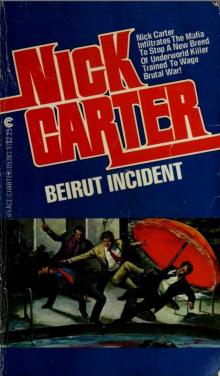 Beirut Incident
Beirut Incident White Death
White Death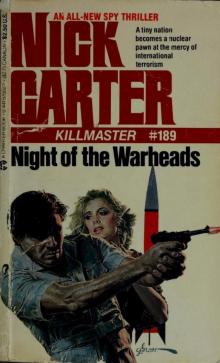 Night of the Warheads
Night of the Warheads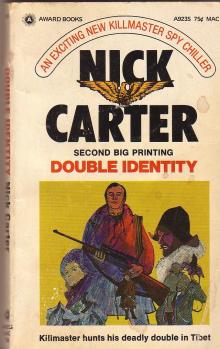 Double Identity
Double Identity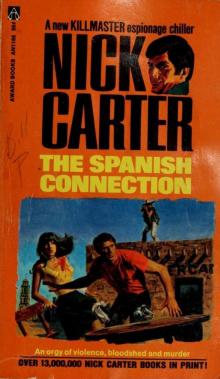 The Spanish Connection
The Spanish Connection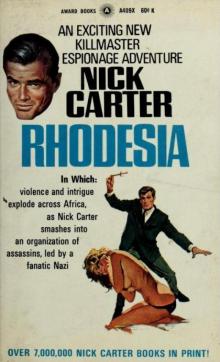 Rhodesia
Rhodesia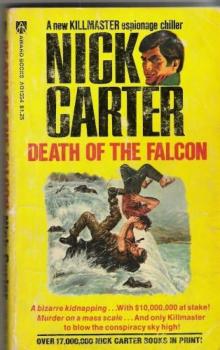 Death of the Falcon
Death of the Falcon The Executioners
The Executioners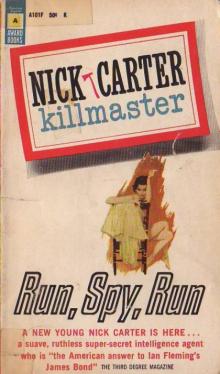 Run, Spy, Run
Run, Spy, Run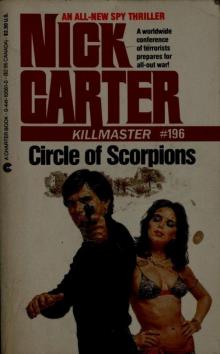 Circle of Scorpions
Circle of Scorpions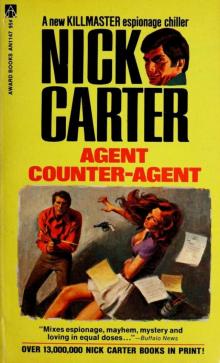 Agent Counter-Agent
Agent Counter-Agent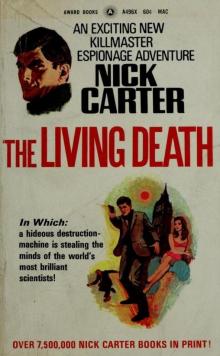 The Living Death
The Living Death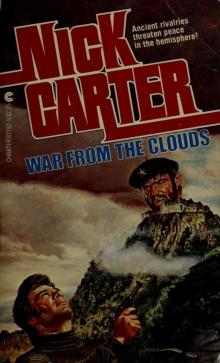 War From The Clouds
War From The Clouds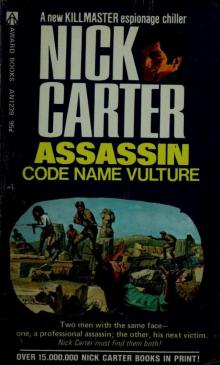 Assassin: Code Name Vulture
Assassin: Code Name Vulture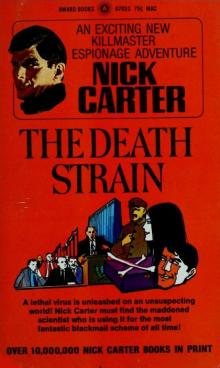 The Death Strain
The Death Strain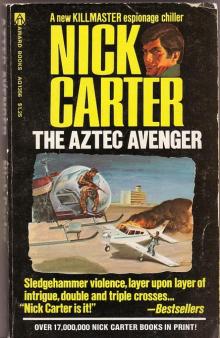 The Aztec Avenger
The Aztec Avenger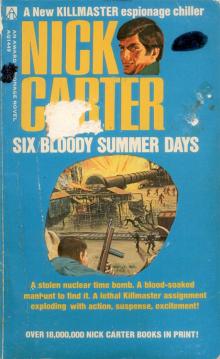 Six Bloody Summer Days
Six Bloody Summer Days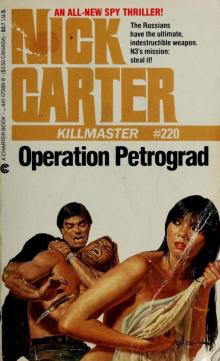 Operation Petrograd
Operation Petrograd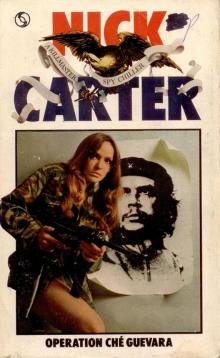 Operation Che Guevara
Operation Che Guevara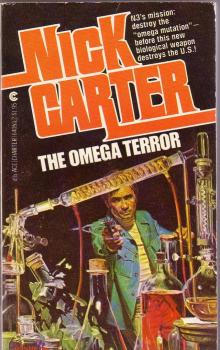 The Omega Terror
The Omega Terror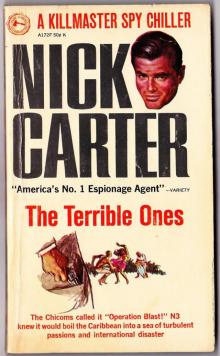 The Terrible Ones
The Terrible Ones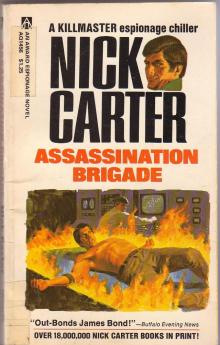 Assassination Brigade
Assassination Brigade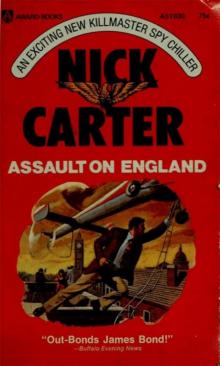 Assault on England
Assault on England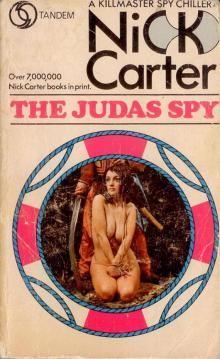 The Judas Spy
The Judas Spy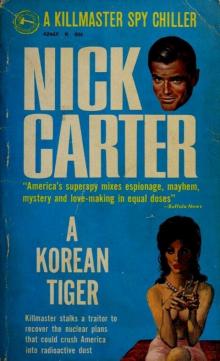 A Korean Tiger
A Korean Tiger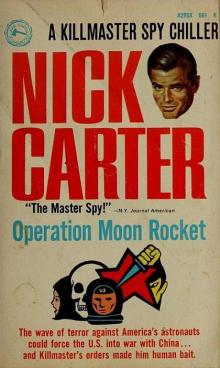 Operation Moon Rocket
Operation Moon Rocket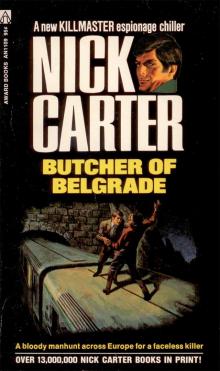 Butcher of Belgrade
Butcher of Belgrade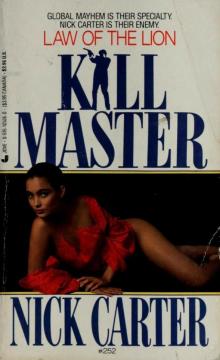 Law of the Lion
Law of the Lion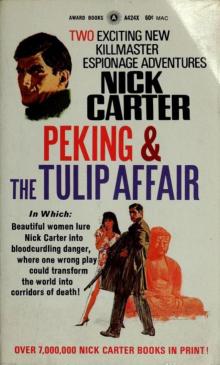 Peking & The Tulip Affair
Peking & The Tulip Affair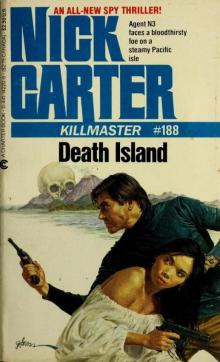 Death Island
Death Island The Jerusalem File
The Jerusalem File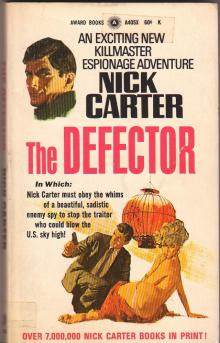 The Defector
The Defector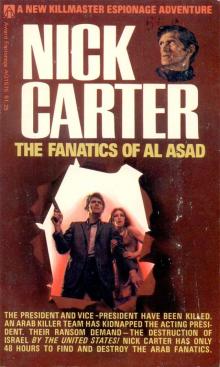 The Fanatics of Al Asad
The Fanatics of Al Asad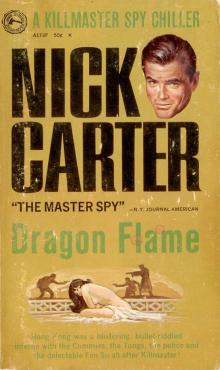 Dragon Flame
Dragon Flame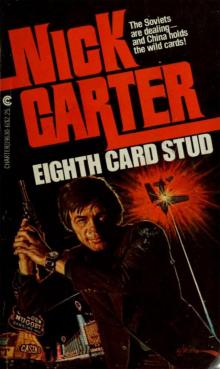 Eighth Card Stud
Eighth Card Stud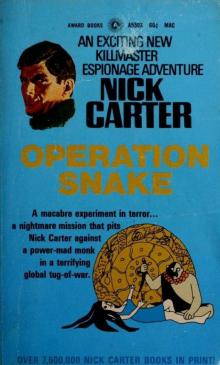 Operation Snake
Operation Snake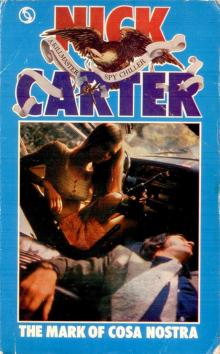 The Mark of Cosa Nostra
The Mark of Cosa Nostra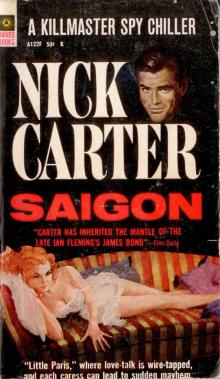 Saigon
Saigon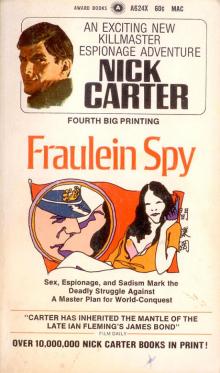 Fraulein Spy
Fraulein Spy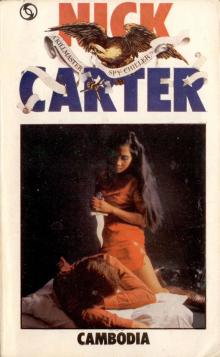 Cambodia
Cambodia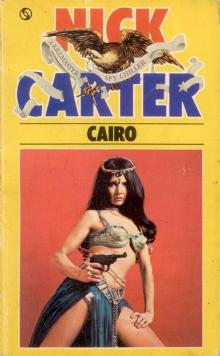 Cairo
Cairo